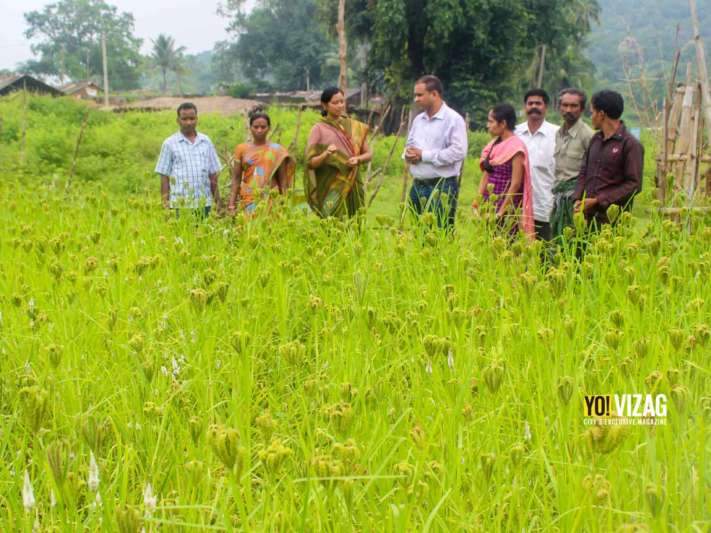A firebrand personality, from the tribal village belt of Srikakulam district, Padala Bhudevi from the Savara Tribe, leads a life that’s true to her name. Having taken upon herself a unique journey, of collecting and transplanting traditional seeds, she brings back a legacy from the brink of extinction. Jaya Siva Murty brings you the story.
Laying the groundwork
Her story started with her father Chinnaya, who was a resident of Seethampeta. Life in and around the village belt had its share of problems as this was a belt that neither came under the agency area nor under the plains. Lack of protection and government support, led to cases of missing land documents, land grabbing and other issues. Due to low awareness, many residents would succumb to circumstances. Moved by the villagers’ plight and defiant on making a difference, Chinnaya, started to work for their welfare, forming the Adivasi Vikas Trust in 1996. He thus helped people through awareness and coordination between the authorities and the parties. In the meantime, Bhudevi had been married into another village. The birth of three daughters was a point of contention, and eventually, Bhudevi’s husband abandoned her and the daughters. She returned to her parent’s house in the year 2000 with her three daughters in tow. Working as a daily wage labourer, for her father wanted her to be financially independent, she eventually became an active participant and a governing member with the trust. In 2007 Chinnaya passed away, and the onus of the work fell upon her shoulders. Changing the name of the NGO to Chinnaya Adivasi Vikas Trust, she started taking an active interest in its work. “The problem of the villages cannot be solved from a distance, so for the next nine years I went and lived in the villages and travelled to 62 villages in three mandals.”
Finding answers
She identified many problems, ranging from a lack of proper roads to the availability of basic amenities such as potable water, health awareness and educational facilities. She began to approach the government and with the help of ITDA, she started spreading awareness on these matters to the people in the village. For every issue that needed government support, she would sit and wait at the offices, just to make them understand and implement her ideas. “It took me three years just going around government offices, sitting there and getting them to listen.” It wasn’t easy, but people began listening to her and soon solutions for problems started falling in place.
Seeing the light
The health awareness camps were eye-openers in themselves. They showed the reality of how people had low haemoglobin, low immunity and health problems. In fact, in one of the villages, babies were being born with severe deformities. Delving deeper into the problem revealed that a healthy diet was missing. Trying to seek a local solution for the local problem, Bhudevi sat down a meeting with the elders of the village. Talks and discussions came about as the elderly reflected about their good old days. They spoke about how they led a more energetic life and also had three to four children without any health issues. The issue of old nutritive value missing in today’s food, lack of minor millets, and the current grains not being strong varieties as the past, were highlighted.
The seed idea
The solution for collecting traditional seeds came about. Going to different houses, Bhudevi and her team started to collect the seeds that some families had saved up for many years. These were then distributed to others and were sown. The harvest was further distributed to people. And in her small quiet yet firebrand way, a revolution started to sprout. The implementation had its hurdles. An awareness camp first had to be conducted and organisations like WASSAN and NABARD in Hyderabad provided their support through the process. Today Bhudevi has collected 125 variants of seeds from the farmers, and each of these has been cultivated to keep the strain alive. Not only this, she and her team of 25 members are also looking at the processing and marketing of forest produce, in a way that it lends health to the village people while providing a good source of income. They are thus making value-added products like tamarind, turmeric, millets and other produce. With minor millets being their core area of focus, aspects of costs, planning and value addition are taken care of by WASSAN. Neelammatalli Millets Biscuits and many products are being produced today. The Comprehensive Revival of Millets Programme (CRMP) started in 2016 by Bhudevi, is now a national programme too and nutritional biscuits are supplied to 47 hostels, with 15000 being sent to the city every day.
Having accomplished so much, Bhudevi isn’t resting on her laurels just yet. She travelled to China in 2013 to study how they were cultivating grains. In order to expand her knowledge base, she also visited the Netherlands to know about their farming techniques. The road for her is still a long one, and there’s much to do. Trying to revive tribal medicine, by bringing formal recognition for it is a dream. Working on henna, which is abundantly available in the reserve forest area is a dream closer to realisation. 30 women have been trained in making mehendi cones and hair-care products with it. 15 of them are already generating income through this project she shares. Sowing the seed of an idea, Bhudevi has also planted hope for the people in her community. We can only wish that it grows into the tree of life, sustaining those around it and spreading its branches far and wide.










Discussion about this post